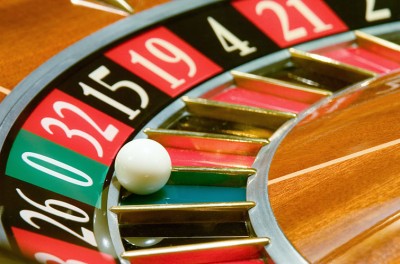Martingale Roulette

It surprises me a little in this day and age where so much information is at our fingertips, that costly misconceptions remain alive and well.
The contention that Martingale Roulette is a sure fired way to make money is among them.
Maybe the problem is finding the truth amongst all the garbage – the claims that it is a system that actually works.
We wrote an article on the shortcomings of using the Martingale to play roulette – whether playing at a traditional casino, or live online casino last year and nothing’s changed since then…including the belief of many players that they can use to crack the game of roulette. This post is the result of an exchange just today with a player who vehemently maintains it works… as it happens, so does he – 9 to 5 every day to fund his use of the system!
So here it is again in really simple English…the dot point Martingale facts that will save roulette players a lot of cash and pain…
- Martingale systems work on the premise that you double your stake on successive losing, even money roulette bets so that when you eventually win, your payout covers all previous losing bets and leaves you with a profit equal to the original (first) bet amount.
- Promoters of the system contend losing streaks can’t last forever so eventually you have to win. Right?
- Wrong! for 2 very good reasons…
1 – raising bets exponentially means even a small losing streak can put your required bet above the table limit so that you are unable to recover previous losses; and
2 – even in the absence of table limit restrictions, each spin is an independent event and it has been proven mathematically that using martingale will still not give the player a long term house edge.
Of course the big fat elephant sitting in the corner that is the giveaway on this debate is this…
Casinos will let you play Martingale to your heart’s content
Surely that tells you something. Advantage blackjack players who can effectively count have been asked to leave the premises; expert roulette players who have identified an exploitable wheel bias and won big as a result will also be shown the door.
But Martingale players! They’ll be given free cocktails, nibbles and the VIP treatment to keep them at the table for as long as possible.
How to play the Martingale system
The premise of the system is simple.
Playing roulette (preferably European) you choose either a red or black bet, and place a bet that is small relative to the table bet maximum. If you win your bet, pocket the winnings and repeat the bet.
If you lose the initial bet, double your initial bet amount and place the bet on the same color as the initial bet.
If you win this bet, the 1:1 payout will cover both bets and leave you ahead by an amount equal to the initial bet amount. If you lose this second bet, you simply double-up and repeat the bet. If you lose again, you simply double up again, and keep on doing so until you eventually win – at which point the amount won will cover all previous bets and leave you with a profit equal to the original bet amount.
Probability considerations
Supporters of this system use the laws of probability to sell its virtues. If you continue betting on the same color, eventually it has to come up and when it does you’re ahead. From a probability point of view they argue the odds of a loss on successive spins get lower and lower the longer the loosing streak.
Playing European or French Roulette the probability that you lose you first spin is 19/37 (a bet on black or red has 18 possible wins, 19 possible losses out of 37 possible outcomes…remember a ‘0’ will be a loss). The probability that you loose both your first and second spin is (19/37) to the power of 2, or 26%. The probability that you loose your first, second and third spin becomes (19/37) to the power of 3, or 14%, and so on until the the odds get pretty damn small.
Loosing 8 in a row runs at less than a 0.5% chance.
Of course where this logic falls over, is that each spin of the roulette wheel is an independent event. The misconception that past events effect future outcomes is often referred to as the Gambler’s Fallacy.
Having lost 7 spins in a row and doubling up for your 8th bet, your odds of losing this spin run at 19/37 and not 0.5%. All of a sudden your odds of a loss aren’t anywhere near as small as you thought, and by now you have a pretty big bet staked on the table. If your starting bet was a meager $5, your 8th bet will be $640 and you’ve already dropped $635!
No problem you say. Stay the course and eventually a win will put you ahead right? Well maybe not.
Table bet maximum considerations
Here’s where many a Martingale player gets tripped up and surrenders a bundle to the casino.
All roulette tables have a table limit. If the bet you need to make under the system eclipses the table’s maximum you’re in big trouble. If the table maximum is $500 and you’ve been unlucky enough to lose 7 in a row starting from a $5 initial bet, all of a sudden a win on your 8th bet still leaves you in the hole. No matter what bet you start with, and what the table max is, this issue will will rear its ugly head eventually, and when it does, the resulting player loss is a big one.
| Bet number | Stake following system | Win or Loss | Cumulative loss |
| 1st | $5 | loss | $5 |
| 2nd | $10 | loss | $15 |
| 3rd | $20 | loss | $35 |
| 4th | $40 | loss | $75 |
| 5th | $80 | loss | $155 |
| 6th | $160 | loss | $315 |
| 7th | $320 | loss | $635 |
| 8th | $640 | ????? |
Of course even before the required bet approaches the table’s max, you start to need pretty deep pockets to defend an unlucky streak. Remember, we’re working with exponential not incremental bet increases here and required bet amounts quickly ramp up to uncomfortable levels.



Leave a Reply
Want to join the discussion?Feel free to contribute!